Abstract
The transcription of structural and intervening sequences of the chicken ovalbumin gene was studied in nuclei isolated from the oviduct, liver, and spleen of chickens in different states of estrogen simulation. The concentration of transcripts of structural and intervening DNA sequences was determined by hybridizing the newly synthesized [3H]RNA to filters containing cloned ovalbumin cDNA (pOV230) or fragments of the natural ovalbumin gene (pOV2.4 and pOV1.8). Of the RNA synthesized by oviduct nuclei from chickens chronically stimulated with diethylstilbestrol, 0.23% corresponded to ovalbumin mRNA and 0.17% were transcripts of intervening sequences. No detectable ovalbumin mRNA sequences were synthesized by nuclei from spleen and liver. After 60 hr of hormone withdrawal, synthesis of ovalbumin mRNA by oviduct nuclei could not be detected. After readministration of estrogen, a gradual increase in ovalbumin mRNA synthesis was observed which began at 1 hr and reached a plateau by 8 hr. For the intervening sequences, similar kinetics were observed for the initial 4 hr. Previously we had identified multiple species of putative precursors of ovalbumin mRNA in oviduct nuclei from chickens chronically stimulated with diethylstilbestrol. We demonstrate here that withdrawal of diethylstilbestrol resulted in a depletion of high-molecular-weight ovalbumin RNA and of mature ovalbumin mRNA and that readministration of the estrogen induced the nuclear accumulation of both forms of ovalbumin RNA. These findings indicate that: (i) a method exists to assay synthesis of hormone-inducible specific eukaryotic [3H]mRNA in vitro; (ii) the estrogen-mediated preferential expression of the ovalbumin gene is maintained in isolated oviduct nuclei; (iii) after hormone withdrawal, a single injection of diethylstilbestrol induces transcription of ovalbumin structural and intervening sequences, with nuclear accumulation of high-molecular-weight ovalbumin RNA and mature ovalbumin mRNA; and (iv) these results are consistent with regulation of ovalbumin mRNA at the level of ovalbumin gene transcription.
Keywords: nuclear transcription, cloned DNA, hormone action, intervening gene sequences, precursor RNA
Full text
PDF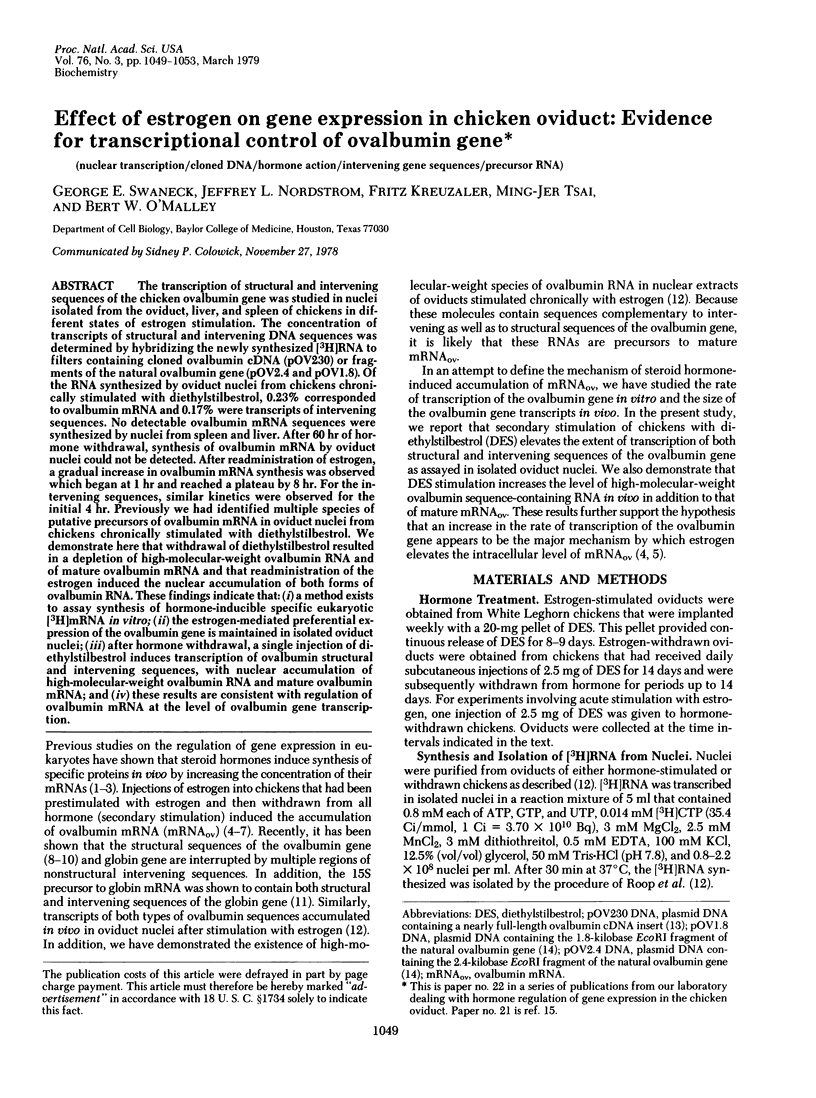
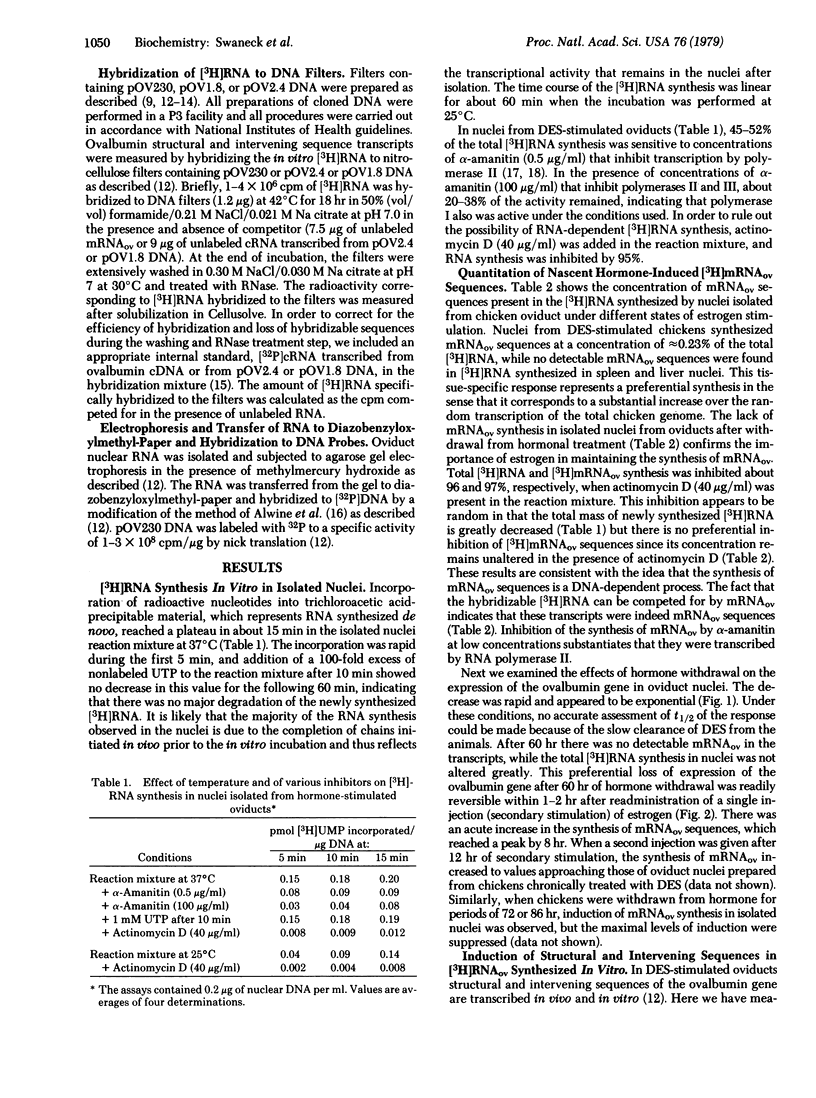
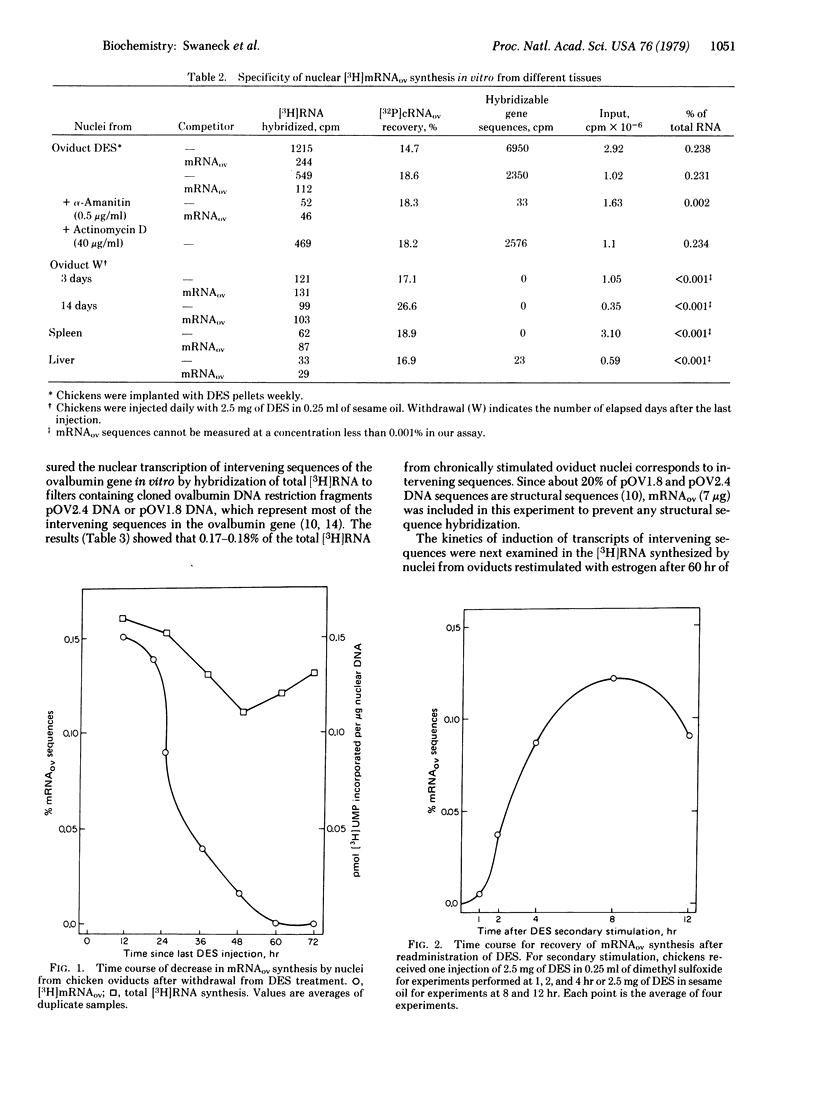
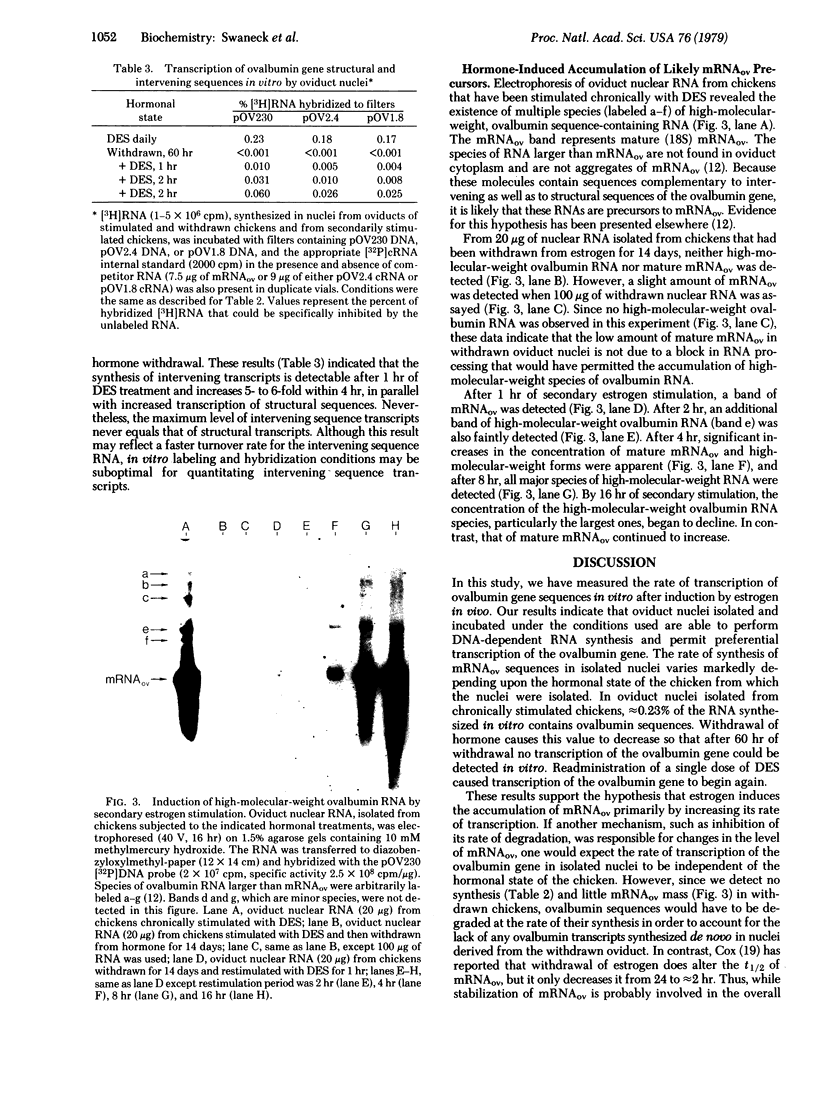
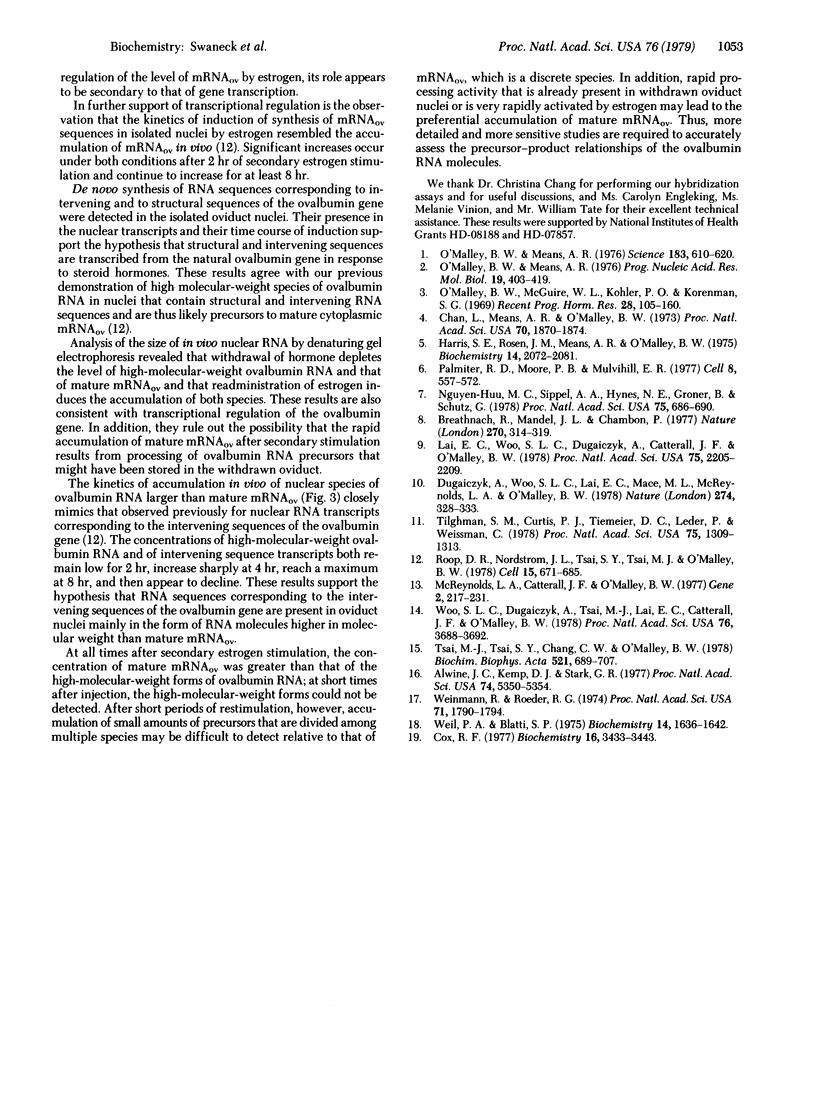
Images in this article
Selected References
These references are in PubMed. This may not be the complete list of references from this article.
- Alwine J. C., Kemp D. J., Stark G. R. Method for detection of specific RNAs in agarose gels by transfer to diazobenzyloxymethyl-paper and hybridization with DNA probes. Proc Natl Acad Sci U S A. 1977 Dec;74(12):5350–5354. doi: 10.1073/pnas.74.12.5350. [DOI] [PMC free article] [PubMed] [Google Scholar]
- Breathnach R., Mandel J. L., Chambon P. Ovalbumin gene is split in chicken DNA. Nature. 1977 Nov 24;270(5635):314–319. doi: 10.1038/270314a0. [DOI] [PubMed] [Google Scholar]
- Chan L., Means A. R., O'Malley B. W. Rates of induction of specific translatable messenger RNAs for ovalbumin and avidin by steroid hormones. Proc Natl Acad Sci U S A. 1973 Jun;70(6):1870–1874. doi: 10.1073/pnas.70.6.1870. [DOI] [PMC free article] [PubMed] [Google Scholar]
- Cox R. F. Estrogen withdrawal in chick oviduct. Selective loss of high abundance classes of polyadenylated messenger RNA. Biochemistry. 1977 Jul 26;16(15):3433–3443. doi: 10.1021/bi00634a022. [DOI] [PubMed] [Google Scholar]
- Dugaiczyk A., Woo S. L., Lai E. C., Mace M. L., Jr, McReynolds L., O'Malley B. W. The natural ovalbumin gene contains seven intervening sequences. Nature. 1978 Jul 27;274(5669):328–333. doi: 10.1038/274328a0. [DOI] [PubMed] [Google Scholar]
- Harris S. E., Rosen J. M., Means A. R., O'Malley B. W. Use of a specific probe for ovalbumin messenger RNA to quantitate estrogen-induced gene transcripts. Biochemistry. 1975 May 20;14(10):2072–2081. doi: 10.1021/bi00681a006. [DOI] [PubMed] [Google Scholar]
- Lai E. C., Woo S. L., Dugaiczyk A., Catterall J. F., O'Malley B. W. The ovalbumin gene: structural sequences in native chicken DNA are not contiguous. Proc Natl Acad Sci U S A. 1978 May;75(5):2205–2209. doi: 10.1073/pnas.75.5.2205. [DOI] [PMC free article] [PubMed] [Google Scholar]
- Nguyen-Huu M. C., Sippel A. A., Hynes N. E., Groner B., Schütz G. Preferential transcription of the ovalbumin gene in isolated hen oviduct nuclei by RNA polymerase B. Proc Natl Acad Sci U S A. 1978 Feb;75(2):686–690. doi: 10.1073/pnas.75.2.686. [DOI] [PMC free article] [PubMed] [Google Scholar]
- O'Malley B. W., McGuire W. L., Kohler P. O., Korenman S. G. Studies on the mechanism of steroid hormone regulation of synthesis of specific proteins. Recent Prog Horm Res. 1969;25:105–160. doi: 10.1016/b978-0-12-571125-8.50006-5. [DOI] [PubMed] [Google Scholar]
- O'Malley B. W., Means A. R. Female steroid hormones and target cell nuclei. Science. 1974 Feb 15;183(4125):610–620. doi: 10.1126/science.183.4125.610. [DOI] [PubMed] [Google Scholar]
- O'Malley B. W., Means A. R. The mechanism of steroid-hormone regulation of transcription of specific eukaryotic genes. Prog Nucleic Acid Res Mol Biol. 1976;19:403–419. doi: 10.1016/s0079-6603(08)60934-4. [DOI] [PubMed] [Google Scholar]
- Palmiter R. D., Moore P. B., Mulvihill E. R. A significant lag in the induction of ovalbumin messenger RNA by steroid hormones: a receptor translocation hypothesis. Cell. 1976 Aug;8(4):557–572. doi: 10.1016/0092-8674(76)90224-5. [DOI] [PubMed] [Google Scholar]
- Roop D. R., Nordstrom J. L., Tsai S. Y., Tsai M. J., O'Malley B. W. Transcription of structural and intervening sequences in the ovalbumin gene and identification of potential ovalbumin mRNA precursors. Cell. 1978 Oct;15(2):671–685. doi: 10.1016/0092-8674(78)90035-1. [DOI] [PubMed] [Google Scholar]
- Tilghman S. M., Curtis P. J., Tiemeier D. C., Leder P., Weissmann C. The intervening sequence of a mouse beta-globin gene is transcribed within the 15S beta-globin mRNA precursor. Proc Natl Acad Sci U S A. 1978 Mar;75(3):1309–1313. doi: 10.1073/pnas.75.3.1309. [DOI] [PMC free article] [PubMed] [Google Scholar]
- Tsai M. J., Tsai S. Y., Chang C. W., O'Malley B. W. Effect of estrogen on gene expression in the chick oviduct. In vitro transcription of the ovalbumin gene. Biochim Biophys Acta. 1978 Dec 21;521(2):689–707. doi: 10.1016/0005-2787(78)90309-x. [DOI] [PubMed] [Google Scholar]
- Weil P. A., Blatti S. P. Partial purification and properties of calf thymus deoxyribonucleic acid dependent RNA polymerase III. Biochemistry. 1975 Apr 22;14(8):1636–1642. doi: 10.1021/bi00679a015. [DOI] [PubMed] [Google Scholar]
- Weinmann R., Roeder R. G. Role of DNA-dependent RNA polymerase 3 in the transcription of the tRNA and 5S RNA genes. Proc Natl Acad Sci U S A. 1974 May;71(5):1790–1794. doi: 10.1073/pnas.71.5.1790. [DOI] [PMC free article] [PubMed] [Google Scholar]
- Woo S. L., Dugaiczyk A., Tsai M. J., Lai E. C., Catterall J. F., O'Malley B. W. The ovalbumin gene: cloning of the natural gene. Proc Natl Acad Sci U S A. 1978 Aug;75(8):3688–3692. doi: 10.1073/pnas.75.8.3688. [DOI] [PMC free article] [PubMed] [Google Scholar]



